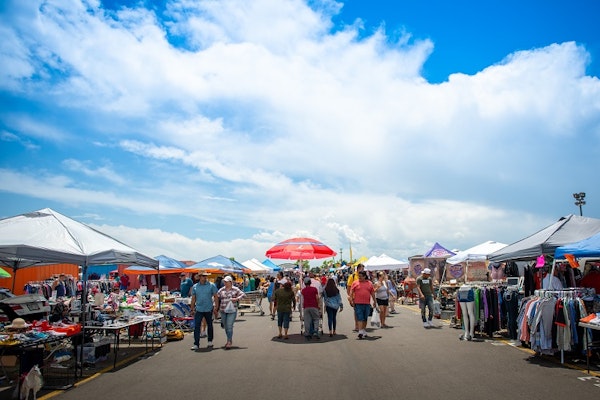
Flea Markets experience growth in the shadow of the circular economy
All around, the holidays are among the busiest times of year, but this particularly rings true for retailers. And as the retail mix begins to shift from brick-and-mortar to online and from big department stores to locally-owned shops, one type of shopping experience appears to be rising — flea markets.
“While traditional main street and mall-based retailers have faced enormous headwinds over the years, the flea market industry has remained resilient, successfully weathering the change in consumer spending patterns,” says Rob Sieban, president and CEO of United Flea Markets, which operates the Mile High Flea Market and Colorado Springs Flea Market in Colorado. “While there is no question flea markets have their ups and downs, they are reliably consistent over the long-term”
Flea markets, and the greater resale market such as thrift shops and consignment stores, have seen a resurgence in recent years as consumer mindsets change and new generations of consumers enter the market. According to Forbes, resale activity represents $24 billion industry and threatens both traditional brick-and-mortar retail sales and internet sales. This market is projected to continue to grow and hit $51 billion by 2023.
While the resale market appeals to all consumers, it is the most appealing to Gen Z (those born between 1995 and 2015). Forbes reports that 37% of Gen Z shops resale, compared to 27% of millenials and 19% of baby boomers.
“Today’s younger consumers (Millennials and Gen Z) are smart, frugal, socially and environmentally conscious,” Sieban says. “The days of ostentatious over spending are not for them. With the advent of apparel and accessory rental companies, we are seeing a heightened desire for vintage and repurposed merchandise. One-of-a-kind offerings are paramount with today’s younger consumers.”
A More Circular Economy
A number of marketplace trends are leading to the rise of resale stores and flea markets including the shift toward a circular economy. A circular economy values regeneration and restoration rather than waste — products in this type of economy are designed and optimized for reuse. As movements for environmentalism and sustainability grow, the circular economy is becoming more appealing to consumers.
A recent survey of 300 executives, conducted by corporate bank and macro-economic research firm ING, found that while only 16% of the U.S. businesses surveyed have adopted the circular economy in some way, 62% intend to include it as part of their business strategy going forward. And for good reason, other reports estimate that the circular economy could generate $4.5 trillion in additional economic output by 2030.
Consumers are using their purchasing power to influence how businesses and retailers operate, putting more thought into who they buy product from as it relates to their own personal values. Increasingly, people are buying from and investing in companies that live a mission at the heart of their business strategy. This is evident in the rise of the B Corp movement, particularly in Colorado, which has one of the largest concentrations of B Corps in the country.
“There's increasing recognition that the businesses that are most successful are the ones that are actually the most nonprofit-like; that create a sense of mission, that create a sense of purpose, their employees work for them because they feel they're doing good in their job, they're changing people's lives in some way,” says Gary Steuer, CEO and president of the Bonfils-Stanton Foundation. “And that makes the business a better business.”
All of these trends and movements have allowed flea markets to thrive. “We believe that today’s consumer rightfully deserves more than a value proposition,” says Sieban. “We fully expect the current trend to continue in the future as consumers focus on value, uniqueness and environmentally sensitive purchases. “
Not only that, but flea markets provide an experience, something else that consumers are starting to value more and more. “Over the years, shoppers have been faced with an experienceless transaction. Shopping at your local flea market provides so much more than a discount price, a day at a flea market is full of discovery for the entire family.”
Published in ColoradoBiz by Ali Longwell.
